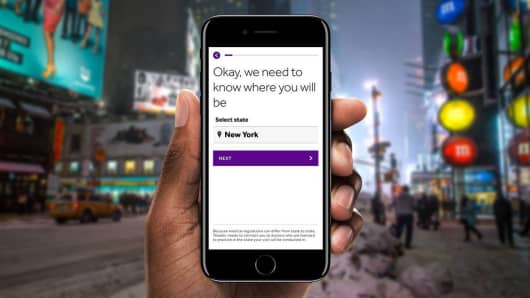Young Men Do Not Look For Medical Help But Virtual Visits Are Changing That

Source: Teladoc
The Teladoc app on a mobile phone.
Young men tend not to seek mental health help. Virtual visits are changing that
- Nearly half of Teladoc's behavioral health visits so far this year have been with men between the ages of 20 and 35.
- Stereotypes about men not talking about their emotions and phrases like "man up" add even more stigma than what already surrounds mental health.
- Telehealth is emerging as an attractive way for young men to seek mental health help.
It's not always easy for men to seek help, especially when it comes to mental health.
Stereotypes about men not talking about their emotions and phrases like "man up" add even more stigma than what already surrounds mental health. Young men busy with their careers may not think they have time to see someone. Telehealth is emerging as an attractive solution to overcome these problems.
Virtual visits allow people to connect with therapists and psychiatrists through video chats, phone calls and texts. One telehealth provider, Teladoc, said nearly half its behavioral health visits so far this year have been with men between the ages of 20 and 35.
The company started advertising more toward young men after identifying a need, said Chief Marketing Officer Stephany Verstraete. It's working. Young men engage with Facebook ads for behavioral health services at double the rate of moms with kids, the group that was traditionally considered the core target.
"What was surprising to us was we actually expected that young women were going to respond better, but I think for us it now feels intuitive," Verstraete said.
Nearly 9 percent of men said they experienced daily feelings of anxiety or depression, according to the Centers for Disease Control and Prevention's 2010 to 2013 National Health Interview Survey. Less than half of them took medication for these feelings or reported having recently talked to a mental health professional.
Men may feel ashamed to seek help because of stereotypes like "that's not what tough guys do," said Dr. Ken Duckworth, medical director of the National Alliance on Mental Illness. They may also think they're going through a rough patch instead of dealing with a mental illness like depression.
If they do decide to seek treatment, the health-care system can make it hard to find a psychiatrist who's within their insurance network. Once people find someone, it can take weeks to see them. Their condition can improve or worsen in that time, or they may change their mind.
Teladoc says the average time from when a member contacts it to when the appointment takes place is less than a week.
Dr. Chris Dennis, a psychiatrist who sees Teladoc patients, said he primarily treats young men for anxiety, depression, stress from relationships and work and sometimes substance use.
For many patients he sees, it's their first time using telehealth or even seeing a mental health professional. Dennis said they tend to ask many questions, such as, "why me," "why now," and "am I going to get better?"
Sometimes people will call him from work so their families don't hear. Some will call at home so people at work don't hear. He's seen patients at 7 a.m. and 9 p.m. He's even talked with people who were huddled in their closet where he could see their shoes in the background.
"(Virtual visits are) a prime opportunity from a treatment and engagement perspective because they're doing it on their own time in a safe environment that's comfortable for them," Dennis said.
For many patients he sees, it's their first time using telehealth or even seeing a mental health professional. Dennis said they tend to ask many questions, such as, "why me," "why now," and "am I going to get better?"
Sometimes people will call him from work so their families don't hear. Some will call at home so people at work don't hear. He's seen patients at 7 a.m. and 9 p.m. He's even talked with people who were huddled in their closet where he could see their shoes in the background.
"(Virtual visits are) a prime opportunity from a treatment and engagement perspective because they're doing it on their own time in a safe environment that's comfortable for them," Dennis said.
Young men, in particular, tend to be more comfortable using technology since they grew up using cell phones and playing video games, Duckworth said. Of those that use Teladoc's behavioral health services, 29 percent request visits through the mobile app, compared with 27 percent of mothers and 15 percent of baby boomers.
"If young men are willing to use telehealth, it would be a fantastic development for public health," Duckworth said. "We haven't been able to get them into treatment because of expectations and societal roles that real men don't fill in the blank. That's the thing we're up against. If this is the vehicle they're comfortable with, then that's great."

Comments